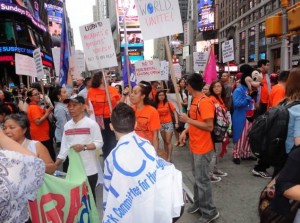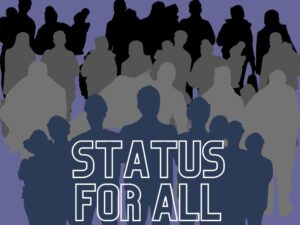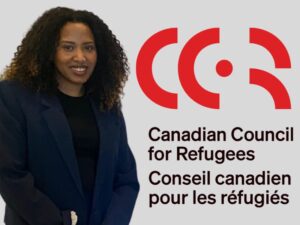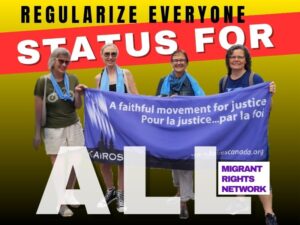The Intersections of Faith, Migration, Human Rights, Development and Justice
Every person bears the inherent gift of the likeness of God.
A true and meaningful dialogue on migration includes migrants as subjects of their own destinies and puts primacy to their human rights and welfare. Such dialogue must not be limited to migration as a strategy for development.
 These excerpts are from a statement issued by Churches Witnessing with Migrants: 4th International Consultation, a gathering of migrants and their allies in New York, October 1-2. This year’s gathering brought together over 100 representatives of local, regional and national grassroots migrants’ organizations, and religious and ecumenical groups from around the world, including Connie Sorio, KAIROS’ Asia-Pacific Partnerships program coordinator.
These excerpts are from a statement issued by Churches Witnessing with Migrants: 4th International Consultation, a gathering of migrants and their allies in New York, October 1-2. This year’s gathering brought together over 100 representatives of local, regional and national grassroots migrants’ organizations, and religious and ecumenical groups from around the world, including Connie Sorio, KAIROS’ Asia-Pacific Partnerships program coordinator.
The consultation focused on the links between faith, migration, human rights, development and justice. It also identified extreme poverty, the exploitation of natural resources, militarization, violent conflicts and war as some of the root causes of forced migration.
In his keynote address, Rev. Dr. Deenabandhu Manchala, Programme Executive for the Just and Inclusive Communities Programme of the World Council of Churches in Geneva, urged the churches to give visibility to the reality of forced migration, which makes people vulnerable to many forms of abuse and exploitation. In addressing the theme of the consultation, The Other Is My Neighbour, Dr Manchala said that the neighbour in Jesus’ parable of the Good Samaritan is not our next door friend, family member, or work colleague, but the nameless and faceless victim, beaten and bruised, and left abandoned by the roadside. He reminds us that “Christian love, if practiced only within circles of familiarity ignoring those whom the society considers ‘the others’ or ‘the inferior’ betrays the essential Christian calling.”
Garry Martinez, chairperson of Migrante International said, “Forced migration is an anomaly. Ours is now an era of modern-day slavery wherein governments, in need of hard currencies, continue to subject migrants and their families to most cruel conditions even while greedily buffeting their domestic economies with the hard-earned monies remitted by migrants. … There can be no human rights if migration is by necessity and not by choice. There can be no genuine and sustainable development if governments continue to consider remittances as lifelines for national economy.”
For the full statement of the 4th International Consultation, and the organizers’ press release, go to:
The Intersections of Migration, Human Rights and Development Justice
For more information please contact:
Alfredo Barahona
Indigenous & Migrants Relations and Network Coordinator
416-463-5312 ext. 251
abarahona@kairoscanada.org







